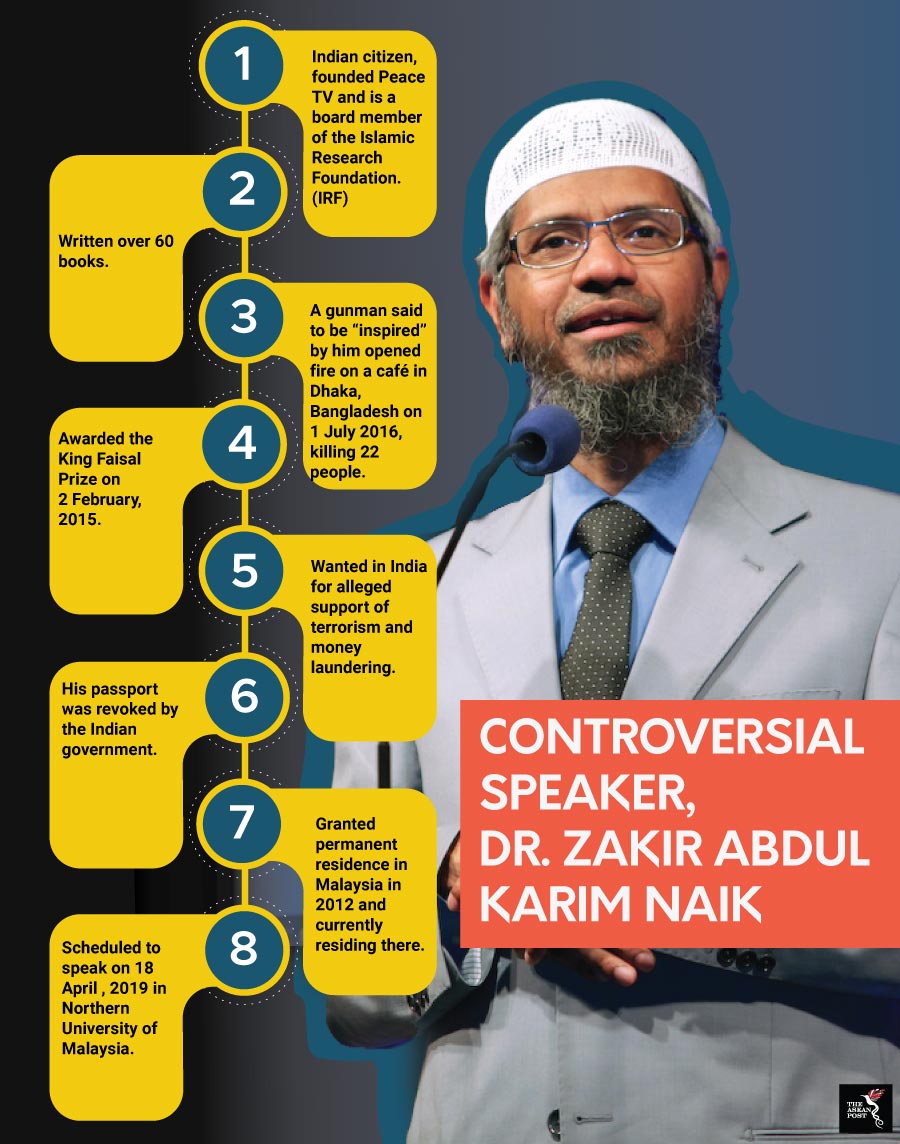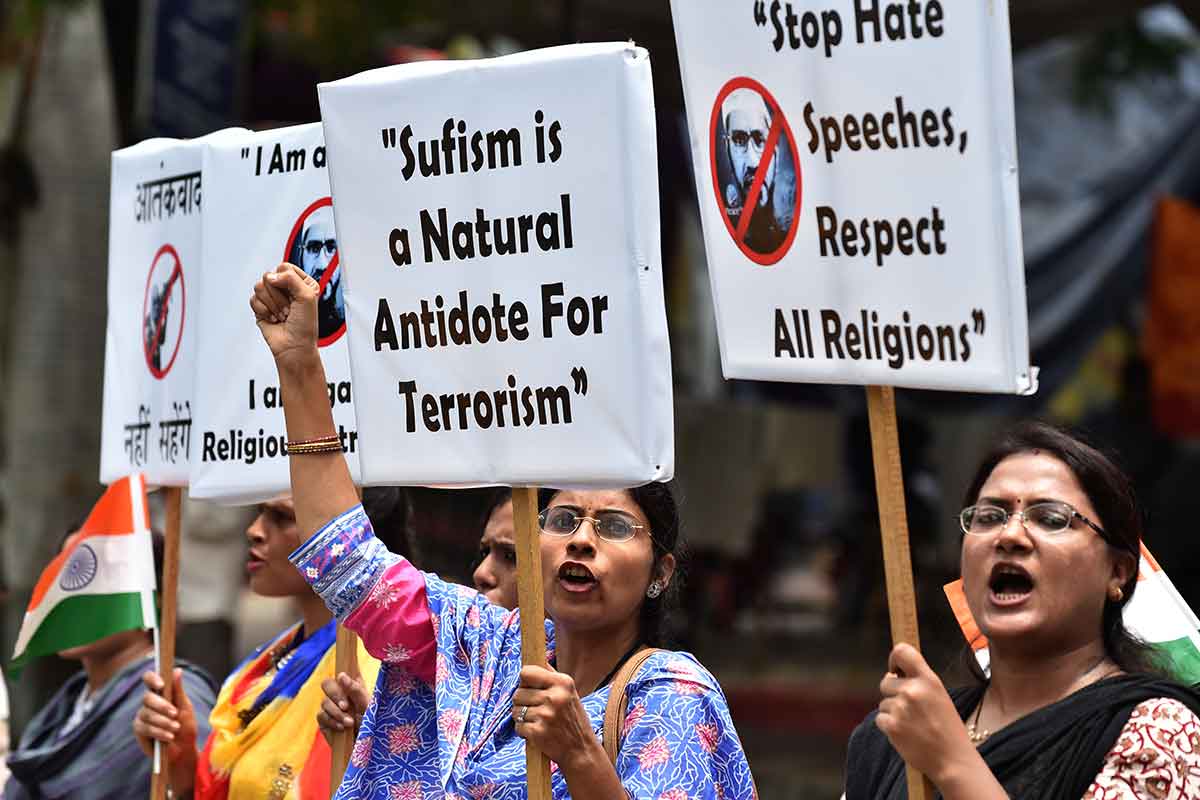Zakir Naik is a controversial Muslim preacher that is currently under investigation by the Indian government for alleged acts of hate speech and money laundering. For years, the 53-year old had given talks through his channel, Peace TV. In a few days, he will be giving a talk to students at the Northern University of Malaysia (UUM) in the state of Kedah with many parties calling for him to be deported back to India for fears of hate speech being spread in Malaysia.
The Deputy Education Minister of Malaysia, Teo Nie Ching had said in response to the outcry, that the University has the autonomy to hold the event but will have to be responsible for any potential incident or concerns that may arise.
Outrage ensued after that statement.
Vice-president of the Malaysian Chinese Association (MCA), Ti Lian Ker, called for the resignation of the deputy minister of education, saying that she is “hiding” behind the concept of autonomy. Many non-Muslims have expressed their disappointment over the talk and said that they believe that the current Malaysian government has no proper stance regarding Zakir Naik, according to Mathis Sarawanan of the National Alliance Youth Volunteers (BNYV).
However, it can be said that Zakir Naik arguably has had a strong influence over Muslims living in Southeast Asia for the longest time now.

Zakir’s preaching
One example is the LGBT issue. Zakir Naik once infamously said that homosexuals are “patients suffering from a sinful mental problem”. Many Muslims in Malaysia have expressed their unease with the LGBT community for a long time. In early March, an International Women’s Day march was cut short due to complaints from several people that there were people from the LGBT community in that march.
This is not isolated to Malaysia. Brunei, in March 2019, came under fire for implementing sharia law and in a response, Erywan Yusof, Brunei’s minister of foreign affairs, said that the implementation, which includes the death sentence for homosexuals, “protects the sanctity of family lineage and marriage”. Stephen Cockburn, Deputy Director of Global Issues at Amnesty International, however, said that this was “sickening and callous in any circumstance”. The roots of Islamic fundamentalism and beliefs, particularly regarding the LGBT community, is seen to have a hold on the Muslim majority nation.
However, not all of Zakir Naik’s teachings are followed verbatim by Muslims in the region. In another one of his infamous quotes he said that “propagation of other religions is prohibited”. He goes on to add that building houses of worship of religions other than Islam should not be allowed. Brunei and Indonesia, both nations with a large Muslim population, still allow some churches to be built on their soil. Whilst Malaysia prohibits the preaching of other religions to Muslims according to article 11 of the Federal Constitution of Malaysia, it does not restrict the practice of other religions.
The harmonious nature of the country can be seen in the state of Sarawak, where in 2019, the Yang Di-Pertua Negeri, Abdul Taib Mahmud, lauded the religious tolerance of the multi-ethnic state, expressing that he is “very fortunate to witness the cooperation between the Muslims and non-Muslims”. Zakir Naik also seems to respect this as he said back in 2018, that he is concerned with fostering “social harmony” among Malaysians as he is a permanent resident in the country. It is seen that religious tolerance is still being practiced by Muslim majority nations in Southeast Asia.
Not all of the preacher’s teachings could be deemed malicious, as Zakir Naik has shown that he is against killing innocents in many of his lectures. He even condemned the Islamic State of Iraq and Syria (ISIS) for their many terror attacks. Quoting the Qur’an, he points to a part of chapter 5 verse 32 that says “whoever kills a soul unless for a soul or for corruption [done] in the land - it is as if he had slain mankind entirely…”.
Indonesia and Malaysia have both condemned ISIS while Indonesia has put many former ISIS members in custody. Malaysia has a more forgiving plan to welcome home former ISIS members to undergo investigation, according to Ayob Khan Mydin Pitchay, head of counterterrorism for Special Branch, the intelligence arm of the Malaysian police. While many Islamic fundamentalists have different opinions with regards to modern society, if anything, Zakir Naik is at least against killing.
Current situation
At the time of writing, Zakir Naik is a permanent resident of Malaysia, as stated by Prime Minister, Dr Mahathir Mohamad back in 2018. This means that Zakir Naik cannot be indicted for charges against him by the Indian government as long as he remains in the country. Zakir Naik also expressed his gratitude, saying that he “remains indebted” to Malaysia.
Under the Federal Constitution of Malaysia, Zakir Naik is allowed to speak at UUM on 18 April, 2019. While many Malaysians are opposed to his teachings, they should at least be confident in the fact that Islam has always condoned good behaviour and kindness above all else.
As stated in the Qur’an chapter 4 verse 32: “…do good to parents, kinsfolk, orphans, Al-Masakin (the poor), the neighbour who is near of kin, the neighbour who is a stranger, the companion by your side, the wayfarer (you meet), and those (slaves) whom your right hands possess…”.
For more than six decades, Malaysia has proven to be a harmonious state despite being a multi-ethnic, multicultural country. A preacher from India whose teachings are controversial albeit a part of the Muslim identity cannot do anything to change that.
Related articles:
The struggle for human rights in ASEAN
